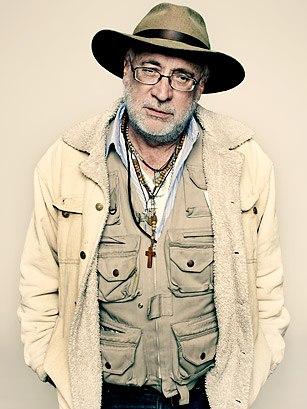
(2 of 2)
"One of the most gratifying moments occurred [during the conference] at Chapúltepec Castle, when President Calderón met a woman named María Elena Herrera, from Calderón's home state of Michoacán, whose four sons disappeared after being abducted by gangsters. The President hugged her, and I could see he was shaken by her experience. I saw his recognition that the victims are human beings and not statistics. I saw his face of pain, and in that moment the President himself became more humanized to me.
"The most disappointing thing was what happened at the end of the caravan at [the northern border city of] Juárez, [which today has the world's highest murder rate], when leftist groups tried to hijack the movement for their own political agendas. [The groups, for example, tried to get the movement to insist that Calderón remove all troops from Mexico's streets, something even Sicilia knew was an impractical and irresponsible demand.] It threatened to drain the force of the movement. It showed me that a protest can't be overly ideological if it's going to be successful.
"The other disappointing thing was gaining a better appreciation of the cluelessness of Mexico's political class regarding the violence crisis. They did begin to make some reform-legislation movements this past year, but deep down I don't feel as if they've really thought about how to fight the cartels in a more effective and less deadly way. I fear we're going into [general] elections next year without that consciousness, without really acknowledging the magnitude of the problem Mexico faces.
"One of the most memorable persons I got to know was Julian Lebaron, [a Mormon farmer from the border state of Chihuahua whose anticrime-activist brother, Benjamin, was murdered in 2009 by gangsters]. I remember one day during the caravan I was trying to put a plaque with names on a memorial to murder victims, and I was using the screwdriver very clumsily, as you'd expect from a poet. Julian came over and said, 'Javier, get your pen and give me the screwdriver.' His speeches during the caravan rallies were like that: very brief but strong and direct.
"That Mormon became a very important symbol for the movement. There was one dangerous moment in Durango, in the plaza there, when armed and masked men showed up at our demonstration. Lebaron took the microphone and said, 'If there are any killers here among us, please raise your hands.' The masked men left. Julian told the crowd, 'You see, when a country unites it creates less space for criminals.'
"A successful protest movement needs humor too. Once, we were on a dangerous stretch of road near Coatzacoalcos, in Tabasco [state], where narcos were known to abduct people at roadblocks. At one roadblock we thought gangsters were going to board our bus and perhaps kill us. One of our companions said he had a nido [nest] in his throat; I said, 'Don't you mean a nudo [knot]?' He said, 'No, a nido because I'm so scared right now I've got my two huevos de pájaro (bird's eggs, slang for testicles) up there.' No gangsters boarded the bus, fortunately, but our friend's joke relieved the tension. Humor helps to make the weight of death more relative.
"I can't say that other protests this year had a big influence on us. It's obvious there's a civic miracle going on in certain parts of the world, especially the Middle East. But I don't think I and others in this movement were really inspired by anything other than our own pain and suffering. In my case, my heart was simply responding to my son's death more than to anything going on in the Arab Spring.
"I think the greatest change the movement produced was that we made the [drug war's] victims' names and faces visible — we reclaimed the victims, put the photos of them smiling before all this horror hit us into the national consciousness. We made the rest of Mexico recognize that we have a national emergency to confront, and we got the nation and its families together to question how the government was confronting it.
"For me personally, it made my faith even deeper — made it naked for the first time in my life. It made the mediation of religion more real than ever for me. I do think the poetry of Hasta la Madre! helped make the mobilization more possible. It's a bit like the idea of prophecy in the Judeo-Christian tradition, a voice speaking out inside the tribe. But personally, I've given up poetry after Juan Francisco's murder because language no longer consoles me, and in lieu of poetry I now depend on that depth of faith that can't be uttered or verbalized.
"I tell my daughter I feel like Ulysses trying to return, between monsters and moral duties, to the nostalgia of my home, and I know one day eventually I will return to that home. But until then, home is no longer a place for me; it's a much broader concept — a community, a nation. If anything, I think we helped Mexico take a big step toward reclaiming that public space for us and not the criminals."
Epilogue: In the past month, two activists in Sicilia's movement have been murdered. Two others have been abducted and are missing. Another human rights activist was murdered in Juárez.